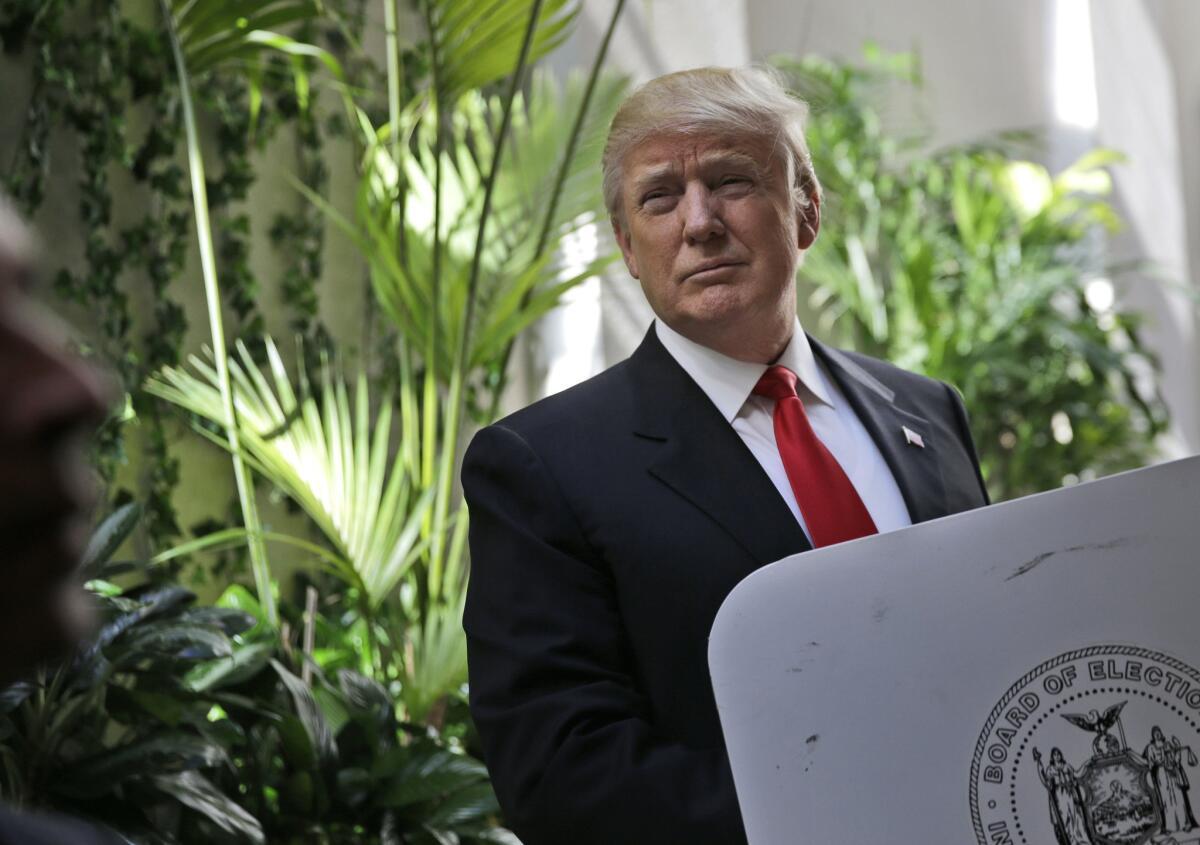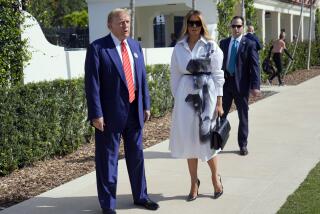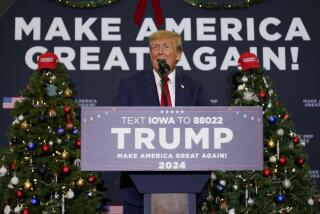Column: Donald Trump has finally discovered strategy

Republican presidential candidate Donald Trump votes in the New York primary April 19. The Anaheim City Council will consider denouncing Trump’s rhetoric.
Donald Trump’s victory in his native New York on Tuesday was huge, as the candidate would say. Next week’s primaries in five other Northeastern states will probably be good for Trump, too. From Connecticut to Pennsylvania and Maryland, “New York values” aren’t an epithet; it’s Trump’s main rival, Ted Cruz, who stands out as something of an alien being.
But more intriguing than Trump’s renewed popularity at the ballot box is a less expected development: Trump finally appears to be thinking strategically.
Over the last two weeks, the famously impulsive real estate promoter has stopped giving nonstop television interviews, reassessed his campaign plan, and made some significant changes.
He’s belatedly realized that his team of insurgents is failing miserably at the basic job of organizing for state caucuses and conventions where delegates are chosen. As a result, Cruz’s campaign is scooping up dozens of delegates in states where Trump actually finished first.
Trump demoted his pugnacious campaign manager, Corey Lewandowski, who is famous mostly for yanking a reporter out of the candidate’s path and then claiming he didn’t.
The candidate hired a new team of campaign mechanics, including the venerable Paul J. Manafort (who rounded up convention delegates for Gerald Ford in 1976) and the younger Rick Wiley (who managed Wisconsin Gov. Scott Walker’s brief campaign last year).
Just like a traditional politician, Trump has begun courting members of Congress and other GOP power brokers who might support him.
He’s planning a series of nonimpromptu speeches on weighty subjects from the economy to foreign affairs, to show — contrary to every impression he’s given so far — that he actually has pondered what a president should do.
Perhaps most significant, there are signs that Trump is willing to spend some money to win the nomination, despite months of bragging that he wouldn’t need to. According to a report in Politico, Trump has promised Manafort a budget of at least $20 million for campaigning in May — far more than he has been willing to spend in a single month so far. That includes money to buy television advertising in California, the most important primary remaining on the calendar.
None of this means that Trump has lost any of his essential Trumpness. His end-stage strategy includes a dose of anti-establishment bluster, too.
He’s accused the Republican National Committee of “rigging” the process against him and of administering “a corrupt system.” He’s accused Cruz of stealing delegates, when all Cruz did was exploit rules that have been in place for more than a year. “Gestapo tactics,” Manafort claimed, promising to file “several protests.”
There are few limits on what a candidate can do to try to win a delegate’s vote -- short of an explicit cash bribe or a promise of federal office.
Trump’s dilemma is that he is likely to arrive at the Republican Convention in July with more primary votes, and more delegates, than any other candidates — but still fewer than the 1237 delegates he needs to win the nomination on the first ballot.
So he’s begun arguing that a mere plurality should give him a moral right to the nomination.
Polls show that many Republicans are sympathetic. A Wall Street Journal/NBC poll found last week that 54% of GOP voters surveyed believe Trump should be awarded the nomination if he has more delegates than anyone else, even if he’s short of a majority. Republican Party Chairman Reince Priebus has pushed back, noting that the rules have always required a majority.
At this point, only one last element is missing from Trump’s strategy: an old-fashioned effort to woo uncommitted delegates.
Amazingly, there are few limits on what a candidate can do to try to win a delegate’s vote — short of an explicit cash bribe or a promise of federal office. “Things like travel and meals and subsistence and expenses are all perfectly legal,” noted GOP lawyer Ben Ginsberg, who isn’t working for any of the remaining candidates.
Manafort, Trump’s new campaign manager, knows the rules well. When he was working for Ford’s reelection campaign in 1976, the candidate invited delegates to White House dinners and rides on Air Force One to bring them into his camp.
Trump claims he doesn’t want to do that this time.
“Look, nobody has better toys than I do,” he said this week. “I can put them in the best planes and bring them to the best resorts anywhere in the world.”
But, he added, “that’s a corrupt system.”
We’ll see how long his self-denial lasts. Other campaigns are already making promises; a South Dakota delegate told her hometown newspaper that Kasich aides offered to “take care” of her while she’s in Cleveland.
“If I get a lunch with LeBron James, that might be a turning point,” she explained.
If Trump stays clear of that kind of deal-making, he’s not the man I think he is.
A presidential campaign is supposed to test whether a candidate can handle complicated, fast-paced challenges under pressure. Or, as Donald Trump would say, does he know how to make a deal? We’re about to find out.
Twitter: @doylemcmanus
Follow the Opinion section on Twitter @latimesopinion and Facebook
MORE FROM OPINION
Sex, love and murder – 400 years after his death, Shakespeare still delivers the goods
Weakening the security of our devices in the name of fighting terrorism doesn’t make us safer
Downtown L.A. isn’t ‘vibrant,’ it’s a gritty melting pot. And that makes it even more compelling
More to Read
A cure for the common opinion
Get thought-provoking perspectives with our weekly newsletter.
You may occasionally receive promotional content from the Los Angeles Times.







